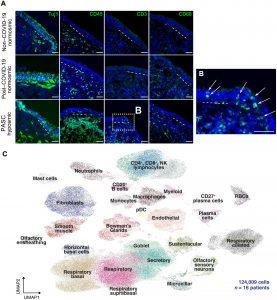In a recent study, researchers found a connection between a persistent immune attack on olfactory nerve cells and a corresponding drop in the number of those cells and the failure of certain persons to recover their sense of smell following COVID-19.
The discovery offers insight on the potential molecular pathways that may be responsible for additional extended COVID-19 symptoms, such as widespread weariness, shortness of breath, and brain fog, in addition to the lost scent.
Nine individuals with COVID-19-related long-term smell loss were included in the study by Goldstein and colleagues from Duke, Harvard, and the University of California-San Diego. They examined olfactory epithelial samples taken from 24 biopsies.
The olfactory epithelium, the tissue in the nose where the smell nerve cells are situated, was shown to have a broad infiltration of T-cells involved in an inflammatory response after a biopsy and single-cell studies (Figure 1) in conjunction with were performed. Despite the absence of measurable SARS-CoV-2 levels, this inflammatory process remained. Additionally, there were fewer olfactory sensory neurons, probably because of chronic inflammation damaging the sensitive tissue.

Figure 1: T cell infiltrates in nasal olfactory epithelial biopsies from PASC hyposmic patients. (A) Representative immunohistochemistry images of nasal biopsy tissue from normosmic non–COVID-19, normosmic post–COVID-19, or PASC hyposmic individuals. Tissue sections were immunostained for the TUJ1 neuronal marker, CD45 pan-immune cell marker, CD3 T cell marker, and CD68 myeloid cell marker. PASC hyposmic tissue showed dense CD45+ immune cell infiltration, including prominent CD3+ lymphocytic infiltration, which was absent in the normosmic groups; scattered CD68+ cells were present in all conditions. (B) Enlarged area (yellow box) from (A) shows CD3+ lymphocytes, with prominent infiltration into the olfactory epithelium (white arrows); dashed white line marks the basal lamina. Scale bar, 50 μm. (C) Additional nasal biopsies were processed for scRNA-seq to permit quantitative analyses. Uniform manifold approximation projection (UMAP) visualization of combined PASC hyposmic and control normosmic scRNA-seq datasets integrating 16 human nasal biopsies permitted robust cell cluster analysis and annotation. RBCs, red blood cells; pDC, plasmacytoid DCs.
They are hoping that controlling these patients’ aberrant immune responses or nose-related healing processes would at least partially help them regain their sense of smell. They said that further research on other long-COVID-19 symptoms that could be experiencing comparable inflammatory processes could benefit from the study’s findings.
Journal article: Finlay, J.B., et al. 2022. Persistent post–COVID-19 smell loss is associated with immune cell infiltration and altered gene expression in olfactory epithelium. Science Translational Medicine.
Summary by Stefan Botha










